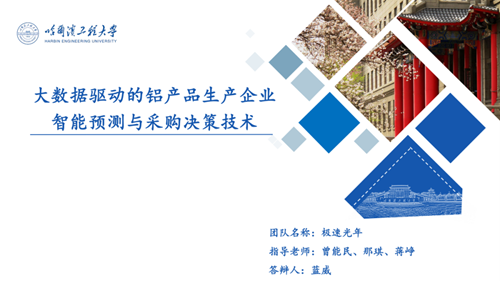The remarkable achievement of the School of Economics and Management team led by ZENG Nengmin, NA Qi, JIANG Zheng in the 18th "Challenge Cup" National College Students' Extracurricular Academic and Technological Works Competition has been recognized with a first-place award in the Reward List special competition. This victory marks a significant milestone, as it represents the college's first-ever breakthrough in this track.

Team Introduction:
Project Supervisor – ZENG Nengmin:
Dr. ZENG Nengmin is an associate professor and doctoral supervisor at Harbin Engineering University. A native of Ganzhou, Jiangxi, he holds a PhD and specializes in big data and intelligent decision-making. Dr. ZENG joined Harbin Engineering University in 2019, after completing his studies at Chongqing University. He has since contributed to numerous research projects, including his role as a key member of the "Key Laboratory of Big Data and Business Intelligence Technology" under the Ministry of Industry and Information Technology. Dr. ZENG's research focuses on big data, intelligent prediction, and supply chain risk management, and he is committed to cultivating high-level business talent in these areas.

Project Team Leader – LAN Wei:
LAN Wei, a master's student in Management Science and Engineering at the School of Economics and Management, focuses on intelligent prediction and decision-making. He has been recognized with several accolades, including the National Encouragement Scholarship, the "Three Good Students" award, the Outstanding Graduation Thesis award, and national third prizes in the 2021 Enterprise Competition Simulation Contest and the 13th Zhengda Cup College Student Market Research and Analysis Competition.

Interview with Dr. ZENG Nengmin
Interviewer: Congratulations to you and your team on your victory in the Reward List special competition! Your project, "Big Data-Driven Intelligent Prediction and Procurement Decision-Making Technology for Aluminum Product Enterprises," is a fascinating achievement. Could you share an overview of this project?
Dr. ZENG: Thank you. Our project was developed through collaboration with the "Key Laboratory of Big Data and Business Intelligence Technology" and is supported by partnerships with major domestic manufacturers like Huawei, CSSC, and Petro China. In the course of these collaborations, we identified a major challenge faced by manufacturing enterprises: the difficulty in making accurate procurement decisions due to fluctuating commodity prices and uncertain future demand.

Most companies currently rely on procurement specialists to make subjective predictions, which is not only inefficient but can also lead to significant losses. To address this, our project uses big data-driven methods to predict future aluminum prices, linking these predictions with production processes, inventory levels, and procurement strategies. The goal is to optimize long-term profitability through intelligent, dynamic decision-making. We have conducted several experiments to demonstrate the effectiveness and innovation of our technology.
Interviewer: This project must have required significant effort. Could you share some of the challenges you faced, and how you guided your students through them?
Dr. ZENG: The competition lasted around five months, and we approached it as a research project. One of the main challenges was that only one graduate student was involved, while the rest were undergraduates, many of whom had little experience in scientific research. They had to learn complex concepts like algorithms, models, and coding from scratch.
To address this, my team and I provided close guidance and support. I also invited collaborators and graduate students to assist with technical challenges. For instance, I took a leading role in developing the dynamic procurement decision-making model, ensuring the team remained on track.
Interviewer: What qualities do you believe are essential for success in scientific research?
Dr. ZENG: Perseverance is crucial. While HEU students have a strong foundation, some may struggle with persistence in the face of challenges. A solid academic base combined with a determined mindset can overcome many obstacles. Of course, a genuine passion for research is key to long-term success.
Interviewer: Do you have any advice for future participants in similar competitions?
Dr. ZENG: I would offer four main suggestions. First, choose a practical, real-world problem to address. Second, treat competitions as serious research, focusing on academic contributions and innovations. Third, advance your knowledge of algorithms and coding, especially in fields like big data and business intelligence. Finally, assemble a strong team with clear roles and effective cooperation. A harmonious team dynamic, guided by an experienced mentor, can make the experience more rewarding and fruitful.
Interviewer: Thank you for sharing your insights, and congratulations again on your team's success!
Interview with LAN Wei
Interviewer: What was the most significant lesson you learned during the competition?
LAN Wei: The most important lesson was understanding the highly specialized nature of the Reward List track. Unlike some innovation and entrepreneurship competitions, this track focuses on solving practical business problems using the technology we've studied. For us, as students in the College of Economics and Management, this was a chance to apply our knowledge to real-world scenarios.
Another key takeaway was the importance of perseverance. The preparation process was long, and at times, it felt challenging. But we had to remain committed and confident that we could succeed. Lastly, the final presentation and defense were crucial. After all the work we did, presenting it clearly and confidently made all the difference.
Interviewer: Thank you for sharing your experience, and congratulations once again!
Many students in the School of Economics and Management have expressed that they gained valuable insights from this competition. The preparation phase emphasized the importance of acquiring various skills in advance, such as model development and coding. The key to success was tackling real-life problems, assembling a cohesive team, and growing together under the guidance of mentors. Students were encouraged to approach challenges with persistence, view competitions as scientific research opportunities, and contribute innovatively to solving practical problems.
During the competition, students learned the importance of teamwork and communication, as well as how to address difficulties through discussion and collaboration with team members and faculty. Additionally, thorough preparation for the final defense, including the creation of effective and visually appealing presentation materials, was essential for success.